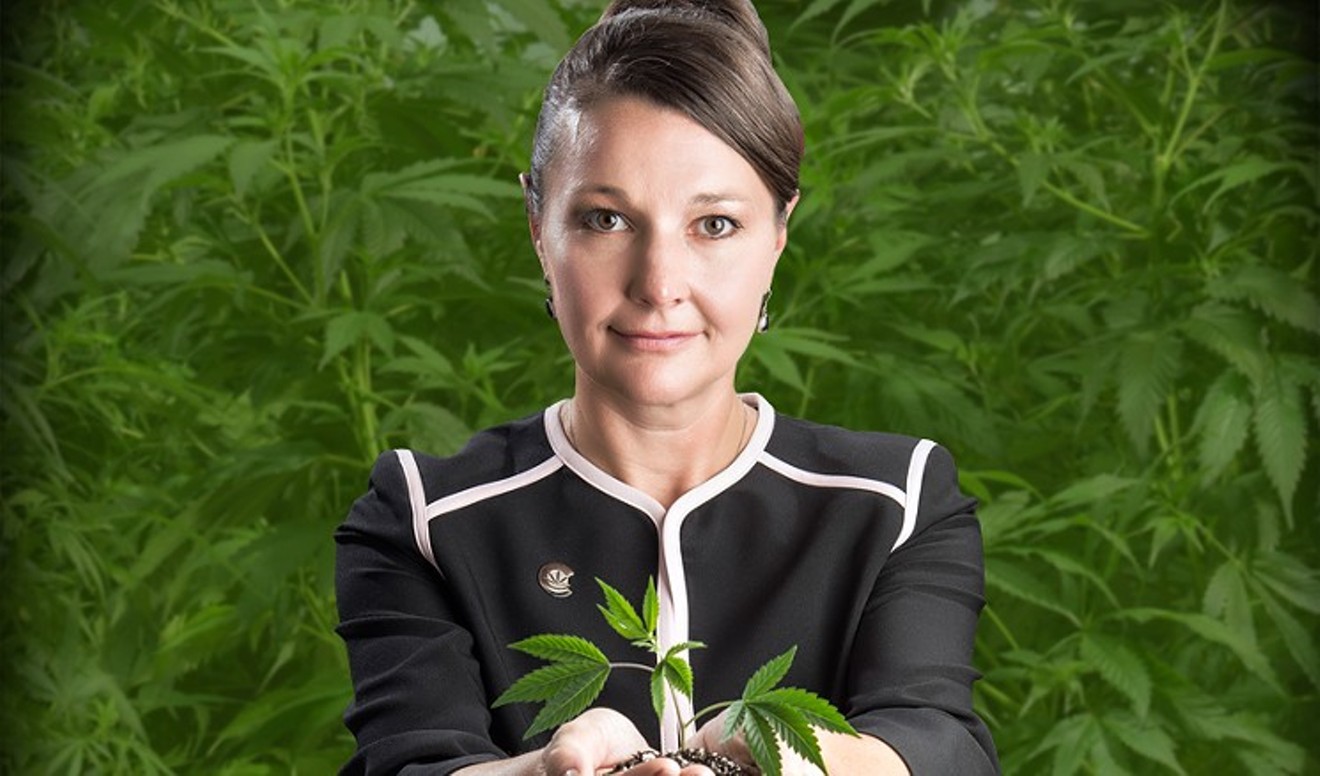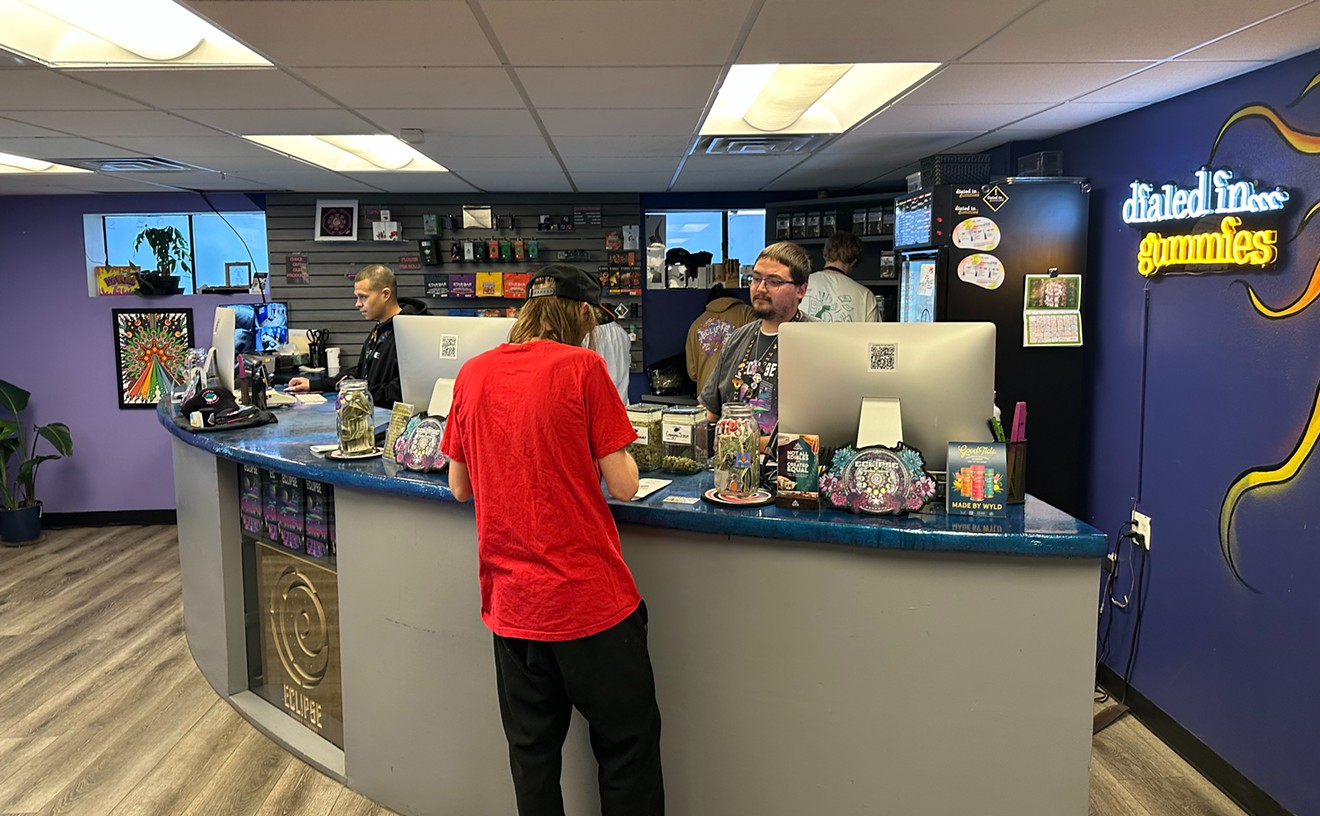Less than a week later, a bill that Sovine had lobbied for hard (and pro bono) that would have added autism to the state's list of qualified medical marijuana conditions, was vetoed by Governor John Hickenlooper.
Westword recently sat down with Sovine to see what one of Colorado's most powerful pot lobbyists will be up to next.
Westword: Were you surprised to find out the city denied your application? What did you think of its reasoning?
Cindy Sovine: I was surprised the city denied my application. We've gone out of our way to work with the city to make it look good. I submitted my application on February 7 with the location setback and the letter from the child-care center asking Denver not to deny my application on their behalf. The city waited nearly four months to deny my application — after I spent tens of thousands of dollars on consultants creating health-and-safety and odor-control plans.
I believe that the city is trying to sabotage I-300 through land-use policies. The city has precedents granting waivers on setbacks to alcohol establishments in the face of strict opposition. In this case, there was broad neighborhood support and support for the setback itself. The city defers to state law on location setbacks, which is 500 feet from the sidewalk. For marijuana consumption establishments, it is 1,000 feet as the crow flies. The city is trying to make it look like there are no solid business models for I-300, when there are really no eligible locations based of the strict proximity requirements the city put in place.
What's your next step?
The city has the discretion to waive or create an exemption to any rule that they themselves put in place. However, since city licensing officials are claiming their hands are tied, despite the precedent they have set with similar exemptions for alcohol licenses, I am taking the issue to Denver City Council. Now that 50 percent of the city's social consumption applications have been denied based on proximity restrictions, I am asking them to amend the setbacks to be consistent with alcohol so that Utopia and other businesses will have a fighting chance at a social consumption license. They have an opportunity to honor the will of the voters where the city has failed to do so, or be held accountable to the voters in the May 2019 elections.
With the dispensary tasting room bill being vetoed and a pot lounge bill never getting out of committee, do you think there will be another attempt at social consumption in the state legislature next year?
I believe that this is going to be a major issue that gets some sunshine in the November elections. As more and more of the country legalizes marijuana, everyone is facing the same problem: where to allow people to consume. Local governments are begging for clarity from the state as they are finding unregulated private social-use businesses popping up all over.
It will depend on who is the next governor, and whether they will have the courage to deal with the actual issues facing the state in regard to cannabis policy. I would like to see each of the candidates discuss their position and whether they would sign the marijuana bills the governor vetoed.

Sovine (middle row; third from left) participated in a rally criticizing Governor John Hickenlooper for vetoing cannabis-related bills in early June.
Thomas Mitchell
I am most surprised that the governor vetoed the bill to add autism to the list of medical marijuana conditions. I hoped when he looked those families in the eyes that it would appeal to his better nature — but that was not the case. He told the media that concerns from the medical community were too great while also suggesting to the families that they should access medical marijuana by claiming pain. He sounded a lot like someone looking to secure the support of the traditional medical community for a run for the presidency in 2020. These industries do not make money off of people who are at home managing their condition with a plant. These families have long memories and access to the press, so time will tell whether that decision works out for him. Additionally, by vetoing HB 1011, the bill to allow publicly traded companies to enter the market, he ensures that Colorado remains at a competitive disadvantage to other states that are reaping the economic rewards and benefits of legalization cannabis while Colorado suffers through the growing pains of being the first state to legalize.
What are some cannabis-related bills or attempted measures to look out for in 2019?
You will definitely see autism again, along with any condition for which an opioid will be prescribed. I suspect you will see publicly traded companies return, along with social use and delivery. With the sunset of the marijuana statutes in play for the next legislative session, you can expect to see a myriad of changes that bring both codes to align with our real-world experience today. While much of the research is still out on the efficacy of cannabis for treating specific conditions, we do know from a toxicity standpoint, it's one of the safest substances on the planet whether you are using recreationally or medically. I hope we will see a governor and a new breed of elected officials who are in touch with the reality of where their constituents are on cannabis policy moving forward. If there is one legacy the governor will leave behind, it's that he managed to unite and galvanize the marijuana industry, consumers and patients for the first time since legalization occurred.












